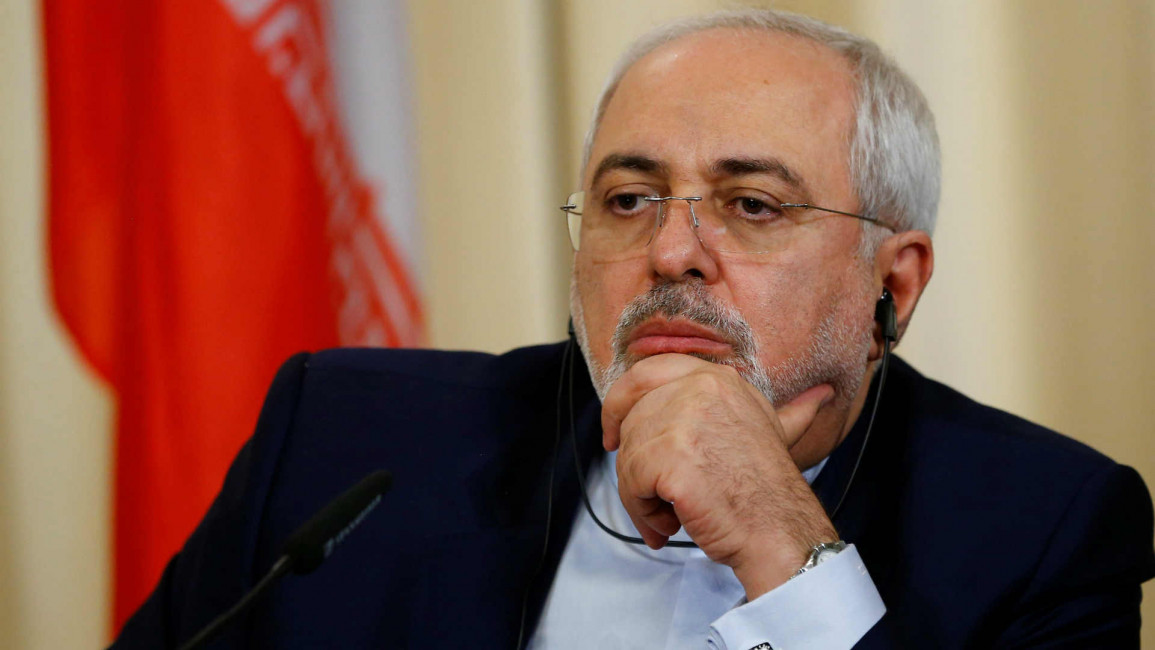
On Iran's booby-trapped gift
On Iran's booby-trapped gift
Comment: Iran should back up it talk about willingness to work towards peace with the withdrawal of militias from Syria, writes Maen al-Bayari.
4 min read
Zarif wrote that Iran was willing to cooperate to end the war in Syria [Anadolu]
Editor's note: The foreign minister of Iran, Mohammad Javad Zarif, wrote an exclusive opinion article for The New Arab, published here. This commentary comes in in response to that article, which is titled Iran is ready to gift peace to Middle East
The (il-)logic of Iran's foreign minister's article contradicts the facts on the ground in Arab countries. The contradiction was particularly apparent when Mohammad Javad Zarif stressed his government's rejection of what he termed "destablising foreign interventions", because it is on this very point that Tehran's culpability is crystal clear.
One is nevertheless urged to receive well the willingness expressed by the foreign minister, on behalf of his government, to "gift peace to the region". Beyond what this actually means, and the condescension it may or may not imply, there is no harm in meeting this positive spirit half way.
Arabs, Zarif should be told, are willing to accept the gift and pave the troubled roads between them and their neighbours through dialogue and in good faith.
However, before this happens, Iran's decision makers must also fulfil conditions that are not hard to pinpoint. After all, it is odd for an adversary to accept a gift from the other without a gesture of good faith.
The gift Zarif wants to give should therefore be in the form of concrete action, through which the Arabs can ascertain that the intentions mentioned in his article reflect a deep conviction in the ranks of Iran's rulers, and not just an offensive of charm.
 |
Iran must abandon its assumption that it is the target of any alliance and friendship between the United States and the Gulf countries |  |
First of all, Iran must abandon her perception that the lands of its Arab neighbours are terra nullius, or a an empty space, devoid of people, to be used as a firing range, an understanding perhaps resulting from a misplaced sense of superiority over Arabs.
Second, Iran must abandon its assumption that it is the target of any alliance and friendship between the United States and the Gulf countries, as long as no sign has been made that states such an intention, because it is the right of every Arab country to choose what is best to protect itself.
Most importantly, the biggest gift Iran can give to the Arabs, her neighbours and partners in pan-Islamic civilisation, is the rapid withdrawal of all militias it has summoned to Syria in aid of its brutal regime. Iran must stop its total violation of this Arab nation, and its attempt to incorporate its people into a project alien to them.
This would be the ideal gesture of good faith, a first and essential step towards stabilising Syria.
 |
It is no exaggeration to say that Iran's dominion over Iraq is tantamount to occupation |  |
Stability was a motif repeated throughout Zarif's article almost convincing the reader that stability is Iran's gift. However, while the foreign minister, on behalf of his government, reaffirmed Iran's non-interference in others' affairs, Iran's interference could not be more blatant - not just in Syria, but also in Iraq and Yemen, under the various pretexts touted by Tehran.
It is no exaggeration to say that Iran's dominion over Iraq is tantamount to occupation. And in Yemen, Iran backs a rogue faction that has deviated from all national consensus in pursuit of a clear Iranian-style project. Yet when the legitimate government sought help from Arab nations, Iran chose to portray it as military aggression.
Iran's barefaced interference in Syria, Iraq, and Yemen, and flagrant attempts to undermine the sovereignty of other Arab nations including Lebanon and Bahrain, are not the only actions that contradict Zarif's assertions and rejections.
Nevertheless, the government that he represents must understand that the Arabs do indeed desire the best possible relations with Iran, but only when Iran's proxies, both visible and otherwise, cease their intrusions in Arab lands.
Maen al-Bayari is a Jordanian author and analyst. He is the Opinion Editor of The New Arab's Arabic-language sister publication, al-Araby al-Jadeed.
Opinions expressed in this article do not necessarily represent those of The New Arab, its editorial board or staff.




